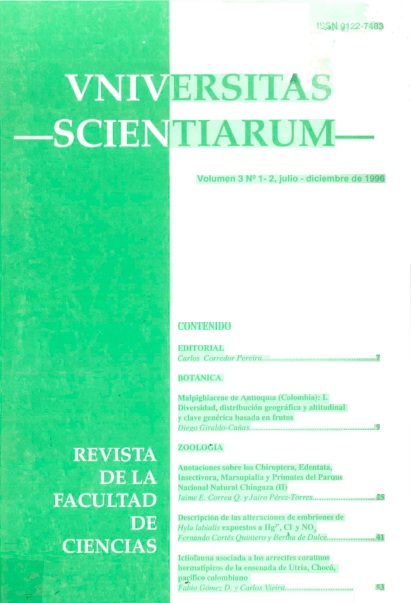Abstract
The effect oftwo aquatic macrophytes (Limnobíwn laevigatum and Eichhomía crassípes) was evaluated on a pilot-scale basis in order to improve an agroindustrial wastewater effluent treatrnent. These species were found to be use fui in stabilizing and neutralizing wastewater pH and depleting total coliforrns, DBO, DQO and total suspended solids concentrations. The removal efficiencies were: total coliforrns, 68 and 22% with L. laevigatum and E. crassípes respectively; DBO, 76 and 53%; DQO, 26 and 18% and TSS, 70 and 56% with L laevigatum andE. crassipes respectively. L. laevigatum produced a increase in total alcalinity in respect to the affluent and was more efficient in fecal coliforrns removal than E. crassipes. No changes on temperature, conductivity, dissolved solids or chloride were obtained for any system in respect to the affluent.Univ. Sci. is registered under a Creative Commons Attribution 4.0 International Public License. Thus, this work may be reproduced, distributed, and publicly shared in digital format, as long as the names of the authors and Pontificia Universidad Javeriana are acknowledged. Others are allowed to quote, adapt, transform, auto-archive, republish, and create based on this material, for any purpose (even commercial ones), provided the authorship is duly acknowledged, a link to the original work is provided, and it is specified if changes have been made. Pontificia Universidad Javeriana does not hold the rights of published works and the authors are solely responsible for the contents of their works; they keep the moral, intellectual, privacy, and publicity rights. Approving the intervention of the work (review, copy-editing, translation, layout) and the following outreach, are granted through an use license and not through an assignment of rights. This means the journal and Pontificia Universidad Javeriana cannot be held responsible for any ethical malpractice by the authors. As a consequence of the protection granted by the use license, the journal is not required to publish recantations or modify information already published, unless the errata stems from the editorial management process. Publishing contents in this journal does not generate royalties for contributors.



